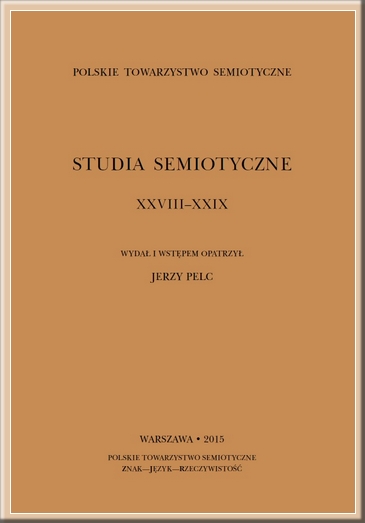Abstract
DOI: http://doi.org/10.26333/sts.xxviii.14
This paper is an attempt to show the basic relations between the content of the given announcement by the prognosticator and its subsequent receivers. The article presents semiotic qualities of the cognitive operations, and the process of receiving and interpreting the final results of such operations, as well as the qualities crucial to the effectiveness of the communicative act between the sender and the actual and potential receivers of the prognosis. The aim of the paper is to explore the semiotic specification of semantic-pragmatic phenomenon called by the author the “Hermes effect”. The article presents the relation between the sender of the prognosis and the primary prognosis in its three meanings: as a text (book, article etc.), the specific type of reasoning (inference, i.e. prognostic argumentation) and the conclusion of the reasoning, as well as the relation between the prognosis and its subsequent receivers. The aforementioned Hermes effect concerns the relation between the way of transferring the content of the prognoses (understood threefold) and the reaction of the addressees, and what happens with the prognosis when it is beyond the first degree sender’s control.
References
Delorme Andrzej, Jan Woleński. 1984. Przewidywania – analiza metodologiczna. Wrocław: Wydawnictwo Politechniki Wrocławskiej.
Eco Umberto. 1994. Lector in fabula. Współdziałanie w interpretacji tekstów narracyjnych. Warszawa: PIW.
Eco Umberto. 1996. Nadinterpretowanie tekstów. W Umberto Eco, Richard Rorty, Jonathan Culler, Christine Brooke-Rose, Interpretacja i nadinterpretacja. Kraków: Znak.
Eco Umberto. 1996. Nieobecna struktura. Warszawa: Wydawnictwo KR.
Eco Umberto. 1976. A Theory of Semiotics. London-Bloomington: Indiana University Press.
Giedymin Jerzy. 1964. Problemy, założenia, rozstrzygnięcia. Studia nad logicznymi podstawami nauk społecznych. Poznań: PWN.
Głowiński Michał. 1973. Narracja jako monolog wypowiedziany W Gry powieściowe. Szkice z teorii i historii form narracyjnych. Warszawa: PWN.
Lyons John. 1984. Semantyka. Warszawa: PWN.
Markiewicz Henryk. 1984. Autor i narrator. W Wymiary działa literackiego. Kraków: Wydawnictwo Literackie.
Meadows Donella H., Dennis L. Meadows, Jorgen Randers, William W. Behrens. 1972. Limits to growth: a Report for the Club of Rome’s Project on the Predicament of Mankind. New York: Universe Books.
Merton Robert K. 1982. Samospełniające się proroctwo. W Teoria socjologiczna i struktura społeczna. Warszawa: PWN.
Mesarović Mihaljo, Eduard Pestel. 1974. Mankind at the Turning Point: the Second Report to the Club of Rome. New York: E. P. Dutton.
Nowak Stefan. 1985. Metodologia badań społecznych. Warszawa: PWN.
Petrażycki Leon. 1985. O różnych gatunkach przewidywań i o znaczeniu praktycznym teoryi. W O nauce, prawie i moralności. Pisma wybrane. Warszawa: PWN.
Podgórecki Adam. 1962. Charakterystyka nauk praktycznych. Warszawa: PWN.
Rolbiecki Waldemar. 1970. Przewidywanie przyszłości. Elementy prognozologii. Warszawa: Wiedza Powszechna.
Węsierski Michał R. 2004. Prognozowanie globalne w naukach o polityce. Problemy metodologiczne. Kraków: Instytut Nauk Politycznych i Stosunków Międzynarodowych Uniwersytetu Jagiellońskiego.


